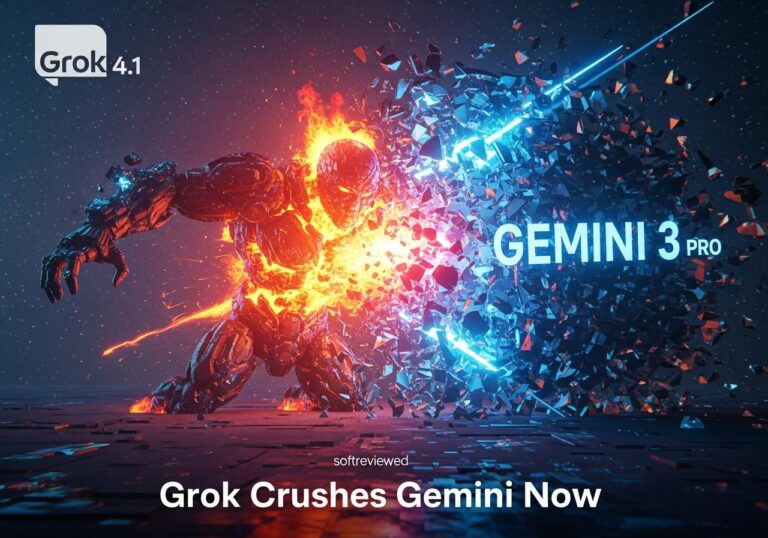🚀 Claude 4: Setting New AI Performance Standards
Anthropic’s latest Claude models redefine what’s possible in AI coding, reasoning, and sustained performance.
🏆 Top Coding Performance
Claude Opus 4 achieves record-breaking 72.5% on SWE-bench and 43.2% on Terminal-bench, outperforming all competitors in coding tasks.
⏱️ Sustained Workflows
Delivers unwavering performance in multi-hour tasks, including 7-hour refactoring tests with no degradation in quality or reliability.
🛡️ Reduced Unsafe Behaviors
Sonnet 4 shows 65% fewer shortcuts/loopholes compared to Sonnet 3.7, improving reliability for critical workflows and sensitive applications.
⚡ Enhanced Alignment & Speed
Sonnet 4 matches Opus performance on coding benchmarks (72.7% SWE-bench) while offering faster responses and improved efficiency.
🛠️ Developer-First Tools
Introduces features like “show_raw_thinking” for transparent reasoning and custom workflow integrations, empowering developers with greater control.
📊 Industry-Setting Benchmarks
Claude models set new standards in AI reasoning, coding, and sustained agency, challenging OpenAI, Google, and others to match these capabilities.
Anthropic's Claude 4: The AI Powerhouse Redefining Coding and Agentic Capabilities 🚀
The world of AI is moving at lightning speed, and Anthropic is once again at the forefront with the release of Claude 4, their most advanced generation of AI models to date. Building upon the successes of the Claude 3 family, Claude 4 promises to revolutionize coding, reasoning, and AI agent capabilities. Get ready to explore the groundbreaking features of Claude Opus 4 and Claude Sonnet 4, and how they're poised to reshape the future of artificial intelligence.✨
Claude 4: Ushering in a New Era of AI Excellence ✨

Anthropic's Claude models have consistently pushed the boundaries of what's possible with AI, and Claude 4 is no exception. With significant advancements in coding proficiency, complex reasoning, and the ability to handle long-running tasks, Claude 4 is setting a new standard for AI performance. This release isn't just an incremental upgrade; it's a leap forward, designed to empower developers and businesses with unprecedented AI capabilities.💪
Meet Opus 4 and Sonnet 4: Anthropic's Dynamic Duo 💪
Claude 4 comes in two distinct flavors, each designed to cater to specific needs and use cases: Opus 4 and Sonnet 4. Think of them as a dynamic duo, each with their own unique strengths and abilities.
Opus 4: The Coding Maestro 💻
Claude Opus 4 is Anthropic's most intelligent model to date, and it's making waves as the world's best coding model. According to Anthropic, Opus 4 excels at tasks that require sustained performance over thousands of steps, enabling it to work continuously for hours on end. This makes it ideal for complex engineering and business challenges, transforming how teams approach development and problem-solving.
- Superior Coding Performance: Leading on SWE-bench (72.5%) and Terminal-bench (43.2%).
- Long-Running Task Mastery: Delivers sustained performance on tasks requiring focused effort and thousands of steps.
- Agentic Powerhouse: Excels at powering sophisticated AI agents for autonomous operation.
Sonnet 4: The Agile All-Rounder 🏃♀️
Claude Sonnet 4 is the successor to Claude 3.7 Sonnet, offering a significant upgrade in coding and reasoning abilities. While it may not match Opus 4 in sheer power, Sonnet 4 provides an optimal balance of capability and practicality. Its enhanced steerability gives users greater control over implementations, making it a versatile choice for a wide range of applications.
- Improved Coding and Reasoning: Delivers superior performance compared to Sonnet 3.7.
- Balanced Performance and Efficiency: Offers an optimal mix of capability and practicality.
- Enhanced Steerability: Provides greater control over implementations.
What Makes Claude 4 Tick? Unveiling the Key Capabilities 🔑
Claude 4's impressive performance stems from a suite of advanced capabilities that set it apart from previous AI models. Let's take a closer look at some of the key features:
Extended Thinking: AI That Can Ponder 🤔
Both Opus 4 and Sonnet 4 feature "extended thinking," allowing them to alternate between reasoning and tool use to improve responses. This capability enables Claude 4 to tackle complex problems that require deeper context understanding and decision-making processes. Instead of just spitting out an answer, Claude 4 can truly think through the problem.
Tool Use: Parallel Processing Powerhouse 🧰
Claude 4 models can use tools in parallel, follow instructions more precisely, and, when given access to local files, demonstrate significantly improved memory capabilities. This means Claude can leverage external resources like web search, code execution, and file access to enhance its problem-solving abilities. Think of it as giving Claude a Swiss Army knife of AI tools.
Memory Lane: Remembering the Important Details 🧠
With significantly improved memory capabilities, Claude 4 can extract and save key facts to maintain continuity and build tacit knowledge over time. This is particularly useful for developers building applications that provide Claude local file access, as Opus 4 becomes skilled at creating and maintaining 'memory files' to store key information. No more forgetting what you told it five minutes ago!
Claude 4 in Action: Real-World Applications 🌎
The capabilities of Claude 4 open up a world of possibilities across various industries and use cases. Here are just a few examples:
Coding Like a Pro: From Debugging to Development 👨💻
Claude 4's exceptional coding abilities make it a valuable tool for developers. From generating code and debugging to understanding complex codebases, Claude 4 can assist with a wide range of programming tasks. GitHub has already announced that it will base its next-generation Copilot coding agent on Claude Sonnet 4, highlighting its strength in agentic scenarios.
Agentic Adventures: Autonomy Unleashed 🤖
Claude 4 is designed to power sophisticated AI agents that can operate autonomously, with little to no human supervision. These agents can process information, make decisions, and take action based on their own internal logic and understanding of the environment. In customer testing, Anthropic saw Opus 4 work on its own for seven hours, demonstrating its potential for long-running, complex tasks.
Beyond the Code: Creative Writing and More ✍️
While Claude 4 excels at coding, its capabilities extend far beyond. With exceptional writing abilities, Claude Opus 4 surpasses previous Claude models and sets new standards for natural, human-like prose. It can also be used for tasks such as:
- Creative writing
- Content summarization
- Data analysis
- Customer service
Safety First: Anthropic's Commitment to Responsible AI ✅
Anthropic has always prioritized AI safety and alignment, and Claude 4 is no exception. The models incorporate advanced safety measures to ensure responsible and ethical AI behavior.
AI Safety Level 3: A New Standard for Security 🛡️
Claude 4 is categorized under the ASL-3 safety tier, Anthropic's internal classification for models with higher capability and therefore higher misuse potential. This places it above the current ASL-2 models in terms of both power and risk.
Guarding Against Misuse: Protecting the Future ⛔️
Anthropic has implemented stricter safety measures for Claude Opus 4, including beefed-up cybersecurity, jailbreak preventions, and supplementary systems to detect and refuse specific types of harmful behavior. These measures are designed to constrain an AI system that could "substantially increase" the ability of individuals with a basic STEM background in obtaining, producing, or deploying chemical, biological, or nuclear weapons.
Claude 4 vs. The Competition: How Does It Stack Up? 🆚
While specific details are still emerging, Claude 4 is expected to surpass existing models from competitors like OpenAI (GPT-4, GPT-5), Google (Gemini), Mistral AI, and Meta in performance and efficiency. Key areas where Claude 4 shines include:
- Coding Performance: Opus 4 leads on SWE-bench and Terminal-bench, surpassing other models in coding tasks.
- Reasoning Abilities: Claude 4 models demonstrate advanced reasoning capabilities, enabling them to tackle complex problems.
- Context Window: Claude 4 boasts a 200K token context window, allowing it to process longer documents and conversations.
Pricing and Availability: Getting Your Hands on Claude 4 💰
Claude Opus 4 and Sonnet 4 are available on the Anthropic API, Amazon Bedrock, and Google Cloud's Vertex AI. Sonnet 4 is also available to free users.
Here’s a breakdown of the pricing:
| Model | Input | Output |
|---|---|---|
| Claude Opus 4 | $15 per million tokens | $75 per million tokens |
| Claude Sonnet 4 | $3 per million tokens | $15 per million tokens |
For more detailed pricing information, check out the official Anthropic pricing page.
The Road Ahead: What's Next for Claude and Anthropic? 🚀
With the release of Claude 4, Anthropic is continuing to push the boundaries of AI innovation. The company is committed to developing AI models that are not only powerful but also safe and responsible. As AI technology continues to evolve, Anthropic is poised to play a leading role in shaping its future. We can expect to see even more advanced capabilities, expanded applications, and a continued focus on ethical AI development in the years to come.
The Dawn of a New AI Age 🌅
Claude 4 represents a significant leap forward in artificial intelligence, offering enhanced performance, expanded capabilities, and a strong emphasis on safety. Whether you're a developer, a business leader, or simply an AI enthusiast, Claude 4 is a game-changer that's worth paying attention to. As AI continues to transform industries and redefine human-technology interaction, Claude 4 is paving the way for a future where AI empowers us to achieve more than ever before.







